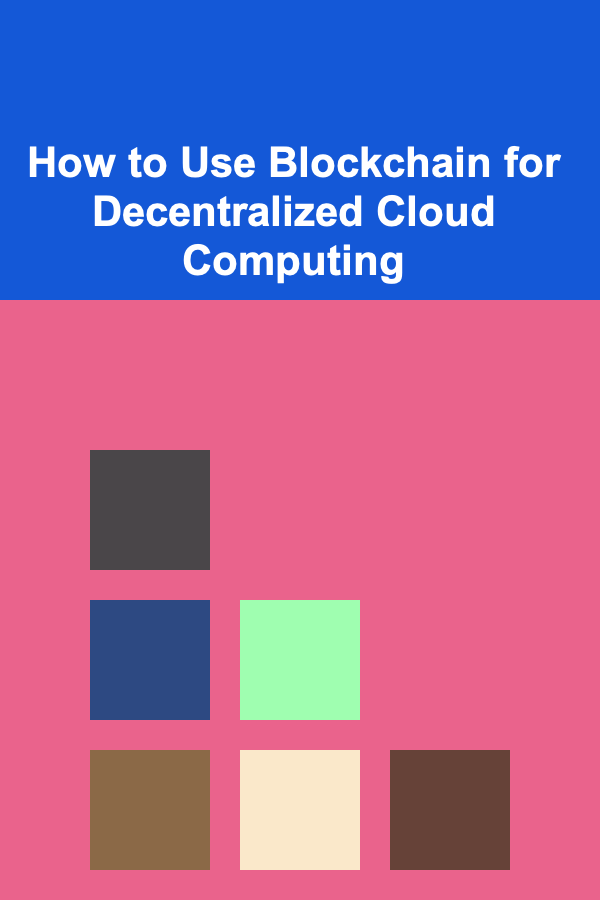
How to Use Blockchain for Decentralized Cloud Computing
ebook include PDF & Audio bundle (Micro Guide)
$12.99$9.99
Limited Time Offer! Order within the next:

Cloud computing has revolutionized the way businesses and individuals manage and store data. The cloud allows for on-demand access to a variety of computing resources such as servers, storage, and applications. However, as cloud computing continues to grow, concerns related to privacy, security, and centralized control of data are becoming more prominent. This is where blockchain technology comes into play.
Blockchain, a decentralized and distributed ledger technology, offers a promising solution to these concerns by enabling secure and transparent transactions without the need for a central authority. In this article, we will explore how blockchain can be integrated into cloud computing to create a decentralized cloud system, offering increased security, privacy, and control for users.
What is Blockchain Technology?
Blockchain is a digital ledger that records transactions across a distributed network of computers, also known as nodes. Unlike traditional centralized databases, where a single entity controls the data, blockchain operates in a decentralized manner, with multiple participants (nodes) validating and recording transactions in a transparent and secure way.
Each "block" in the blockchain contains a list of transactions, and once a block is filled, it is linked to the previous block, creating a "chain" of blocks. This makes it tamper-resistant, as altering a single block would require changing all subsequent blocks, which is computationally infeasible.
Blockchain technology is widely recognized for its application in cryptocurrencies like Bitcoin, but its potential extends far beyond digital currencies. Its core features---decentralization, security, transparency, and immutability---make it an ideal candidate for use in decentralized cloud computing.
What is Decentralized Cloud Computing?
Traditional cloud computing is based on centralized systems, where a third-party provider, such as Amazon Web Services (AWS), Microsoft Azure, or Google Cloud, owns and manages the infrastructure. This centralized approach comes with certain limitations, such as:
- Security Risks: Centralized cloud providers are attractive targets for hackers, as a breach in one location can compromise vast amounts of data.
- Privacy Concerns: Centralized cloud systems often require users to trust the cloud provider with their sensitive information, which can raise privacy concerns.
- Data Control: Users have little control over their data when it is stored on centralized servers. Cloud providers may control how the data is used and who has access to it.
Decentralized cloud computing, on the other hand, aims to distribute computing resources across a network of nodes, removing the need for a central authority. In this system, users can share their computing resources (storage, processing power, etc.) in exchange for compensation, and they retain control over their own data. This model ensures greater privacy, security, and data sovereignty, addressing many of the concerns associated with traditional cloud systems.
How Blockchain Enhances Decentralized Cloud Computing
Blockchain provides the foundational technology to implement decentralized cloud computing. By utilizing blockchain's key attributes, such as decentralization, immutability, and smart contract functionality, cloud computing can be transformed into a more secure, efficient, and transparent ecosystem. Below are the key ways in which blockchain enhances decentralized cloud computing.
1. Decentralization
One of the primary advantages of blockchain is its ability to decentralize the storage and processing of data. Traditional cloud computing relies on a centralized data center, where all resources are managed by a single entity. This creates a single point of failure, and any disruption to the central infrastructure can lead to a service outage or data breach.
In a decentralized cloud model powered by blockchain, data and computing resources are distributed across a network of nodes, which are owned by various independent participants. Each node in the network can act as a storage provider, processing power provider, or both. The blockchain ensures that each participant is compensated fairly for their contribution to the network through a transparent and automated payment system.
This decentralized approach eliminates the reliance on a single provider and minimizes the risk of data breaches or service disruptions. It also reduces the need for a central authority to oversee the system, giving users more control over their data and resources.
2. Security
Security is a top concern in traditional cloud computing, where users must trust a central provider to secure their data. Blockchain's decentralized nature and cryptographic features provide an extra layer of security, making it much harder for hackers to compromise the system.
Each transaction on a blockchain is encrypted and recorded in a distributed ledger, which is shared among all participants. Once a transaction is added to the blockchain, it is immutable, meaning it cannot be altered or deleted without the consensus of the network. This makes blockchain an excellent tool for preventing unauthorized access to data, as any attempt to tamper with the data would be immediately detectable.
In a decentralized cloud system, users' data can be split into smaller chunks and encrypted before being distributed across the network. This ensures that even if a single node is compromised, the data remains secure and inaccessible to unauthorized parties. Additionally, blockchain's consensus mechanisms, such as proof of work (PoW) or proof of stake (PoS), ensure that transactions and data storage are validated by multiple participants, making it much more difficult for malicious actors to manipulate the system.
3. Transparency and Accountability
One of the key benefits of blockchain is its transparency. All transactions on a blockchain are publicly recorded and can be viewed by anyone in the network. This creates a system of accountability, as users can track the flow of data and resources in real time.
In the context of decentralized cloud computing, transparency ensures that users can verify how their data is being stored and used. It also enables greater accountability for cloud service providers, as they cannot alter or delete transaction records without the consensus of the network. This level of transparency can help build trust between cloud users and service providers, reducing the potential for fraud or misuse of data.
For example, a decentralized cloud platform built on blockchain can track which users contributed computing resources and how much they were compensated. This ensures that users are fairly rewarded for their participation in the network and prevents abuse of the system.
4. Immutability
Immutability refers to the property of a blockchain that ensures once a transaction is recorded, it cannot be altered or deleted. This feature is critical for ensuring the integrity of data in a decentralized cloud computing system.
In traditional cloud computing, data stored on centralized servers can be modified or deleted by the cloud provider or other authorized parties. This can lead to data loss, tampering, or even unauthorized access. However, in a blockchain-based decentralized cloud system, once data is recorded on the blockchain, it is immutable. This makes it an ideal solution for sensitive data, as users can be assured that their data will remain intact and unaltered.
Moreover, immutability also plays a crucial role in auditing and compliance. Since all transactions are permanently recorded on the blockchain, it is easy to track and verify the history of data storage, access, and modification. This can be particularly valuable for industries with strict data privacy regulations, such as healthcare, finance, and legal sectors.
5. Smart Contracts for Automation
Smart contracts are self-executing contracts with the terms of the agreement directly written into code. They automatically execute and enforce the terms of an agreement once predefined conditions are met. In a blockchain-based decentralized cloud computing system, smart contracts can be used to automate various processes, such as resource allocation, payment, and data access.
For example, a user who needs extra computing resources can create a smart contract with a cloud provider (node) to rent storage or processing power. The smart contract will automatically execute once the terms are met, ensuring that both parties fulfill their obligations without the need for a third-party intermediary. This can greatly reduce costs and improve the efficiency of the system.
Smart contracts also enhance security by eliminating the need for trust between parties. Since the contract is executed automatically, there is no risk of one party failing to honor the agreement. This level of automation and trust ensures that the decentralized cloud system operates smoothly and fairly.
6. Data Sovereignty
Data sovereignty refers to the concept that individuals and organizations should have control over their own data, including where it is stored, who has access to it, and how it is used. In a decentralized cloud system, blockchain technology can help ensure that users retain full control over their data.
Rather than relying on a central provider to manage and store data, users can choose where their data is stored and how it is accessed. Blockchain's transparency and immutability features allow users to track and verify how their data is being used, ensuring that their privacy and sovereignty are respected.
Moreover, blockchain can also be used to implement a decentralized identity system, where users have full control over their digital identities. This eliminates the need for a centralized authority to manage user identities and provides a more secure and private way to authenticate users in a decentralized cloud system.
Conclusion
Blockchain technology has the potential to transform the way cloud computing operates by decentralizing the storage and processing of data. By leveraging blockchain's core features---decentralization, security, transparency, immutability, and smart contracts---decentralized cloud computing systems can offer enhanced security, privacy, and control for users.
As more organizations and individuals look for ways to protect their data and reduce their reliance on centralized cloud providers, blockchain-based decentralized cloud systems are becoming an increasingly attractive option. However, there are still challenges to overcome, such as scalability, energy consumption, and interoperability between different blockchain platforms. Nonetheless, with ongoing advancements in blockchain technology and the growing demand for decentralized solutions, the future of cloud computing looks set to be more decentralized, secure, and user-centric.

How to Create a Memory Book for Seniors
Read More
How to Invest in Sustainable Agriculture and Green Technologies
Read More
How to Protect Your Home from Identity Theft and Mail Fraud
Read More
How to Use Affiliate Marketing to Make Money
Read More
How to Use Social Trading Platforms
Read More
The Transportation Coordinator's Playbook: Streamlining Routes and Deliveries
Read MoreOther Products

How to Create a Memory Book for Seniors
Read More
How to Invest in Sustainable Agriculture and Green Technologies
Read More
How to Protect Your Home from Identity Theft and Mail Fraud
Read More
How to Use Affiliate Marketing to Make Money
Read More
How to Use Social Trading Platforms
Read More